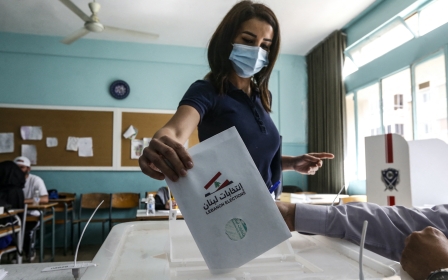Lebanon elections: Hezbollah and allies lose parliamentary majority

Lebanon's Hezbollah and its allies have lost their parliamentary majority, according to full legislative results announced by the interior ministry on Tuesday.
The party and its allies won around 62 of parliament's 128 seats in Sunday's election, short of the 65 required for a majority, in a reversal of the 2018 result when they secured 71 seats.
Stay informed with MEE's newsletters
Sign up to get the latest alerts, insights and analysis, starting with Turkey Unpacked
Hezbollah's opponents, including the Saudi-aligned Lebanese Forces - a Christian faction - gained ground, claiming to have overtaken the Hezbollah-allied Free Patriotic Movement (FPM) as Lebanon's biggest single Christian party.
In one of many startling results, a political newcomer dislodged the Hezbollah-allied Druze politician Talal Arslan, heir to one of Lebanon's oldest political dynasties.
Other prominent Hezbollah allies to lose seats included Sunni politician Faisal Karami, scion of another political dynasty, the final results showed.
In the first election since Lebanon's devastating economic collapse and the Beirut port explosion of 2020, reform-minded political newcomers won 13 seats, an unexpectedly significant breakthrough into a system long dominated by the same political parties. Twelve of them will sit in parliament for the first time.
At least five out of 19 elected MPs for the capital Beirut are independents.
One of the most notable victories achieved by independents was the election in southern Lebanon, a Hezbollah and Amal Movement stronghold, of Elias Jradeh and Firas Hamdan for seats that the two Shia parties had not lost in three decades.
The results leave parliament split into several camps, none of which have a majority, raising the prospect of further political paralysis and tensions that could delay badly needed reforms to steer Lebanon out of its economic collapse.
'Flagrant violations'
Some reformists accused traditional political parties of trying to force the invalidation of some diaspora votes, on which they had pinned their hopes for election.
The Lebanese Association for Democratic Elections said their independent observers had to pull out from some polling stations after they were threatened by supporters of traditional parties.
They complained of "flagrant violations" and irregularities in a statement on Monday. The interior minister denied the allegations.
Middle East Eye delivers independent and unrivalled coverage and analysis of the Middle East, North Africa and beyond. To learn more about republishing this content and the associated fees, please fill out this form. More about MEE can be found here.





